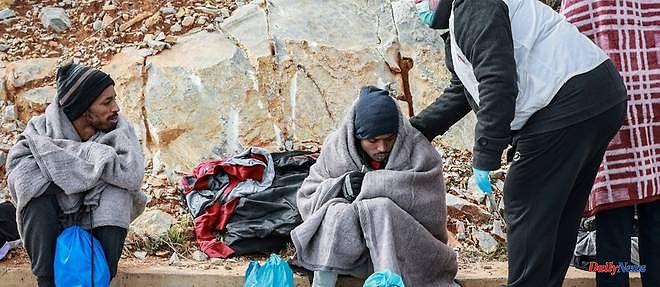At the heart of tough negotiations, the European asylum reform passed a key stage on Tuesday, with a first vote in Parliament on several major texts, in particular on solidarity between Member States in the reception of exiles.
The migration issue has returned to the top of the European agenda: asylum applications have started to rise again in the EU and migrants regularly die trying to cross the Mediterranean on makeshift boats.
The European Commission presented in September 2020 a "Pact on Migration and Asylum" to ensure a better distribution of asylum seekers within the bloc, a new attempt at reform after the failure of the compulsory quotas decided in the aftermath of the 2015 refugee crisis.
Four texts of this reform, amended by MEPs, were largely approved on Tuesday by the Parliament's Civil Liberties and Home Affairs Committee, paving the way for negotiations with the Member States which promise to be difficult.
"Migration challenges arise for all European countries, and I am really happy with this very positive sign. We want a harmonized European response, rules, and greater solidarity between the Member States", reacted French MEP Fabienne Keller (Renew Europe, centrists and liberals), rapporteur for one of the texts.
She considered that the reform contained "elements of balance" likely to respond to the various concerns of the member states, recalling the common objective of reaching a final agreement on the entire reform before May 2024.
"Parliament has taken responsibility for moving forward", welcomed Swedish MEP Tomas Tobé (EPP, right), rapporteur for the central text which revises the criteria defining the country responsible for processing a request. of asylum.
Under the current rules (Dublin Regulation), the responsible country is usually the one through which a migrant arrived in the EU, which places a burden on countries such as Italy, Greece, Cyprus, Malta or Spain a burden they consider disproportionate.
The reform proposal strengthens the criterion of the presence of a family member of an asylum seeker in a European State. It broadens the concept of family ties and provides for a new criterion, according to which the European country issuing a diploma is responsible for processing the asylum application of its holder.
A compulsory solidarity mechanism is planned for Member States facing migratory pressure, in particular due to the disembarkation of migrants following a rescue operation at sea.
European countries will have to commit each year to receiving a certain number of asylum seekers (relocations) or to contributing through financial, material or human support measures to countries under pressure.
In the event of an exceptional crisis situation due to a massive and sudden influx of migrants, which will be assessed by the Commission, Parliament wants these relocations to become the only possible option to help the country concerned.
A prospect which, however, is likely to come up against the refusal of certain countries such as Hungary, known for its anti-migrant policy.
"I know it will be difficult (...) I am well aware that in the end there will be compromises," commented Spanish MEP Juan Fernando Lopez Aguilar (Socialists and Democrats group).
There are also plans for reinforced checks on migrants at the borders, and accelerated asylum procedures for nationals of countries considered safe and having the least statistical chance of obtaining protection status in the EU.
In 2022, more than 880,000 first asylum applications were lodged in the EU, mainly by Syrians, Afghans, Venezuelans and Turks, mainly in Germany, France, Spain and Austria, according to the latest Eurostat data. , which notes a 64% increase from 2021.
Many European countries, Austria in the lead, are demanding that the EU finance fences to prevent the arrival of migrants, particularly at the Bulgaria-Turkey border. Meeting at the summit in February, the leaders took an ambiguous position on this subject.
If the leader of the EPP group, the main political force in the European Parliament, the German Manfred Weber, supports the idea of financing these walls, the Budget Committee voted against it in a vote on Tuesday morning.
28/03/2023 17:44:04 - Bruxelles (AFP) - © 2023 AFP












